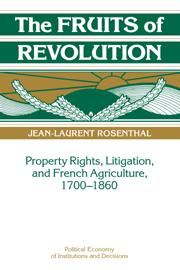Book contents
- Frontmatter
- Contents
- List of tables, figures, and maps
- Series editors' preface
- Preface
- 1 Introduction
- PART I HISTORY AND ECONOMICS
- PART II DRAINAGE AND IRRIGATION
- PART III PROPERTY RIGHTS AND LITIGATION UNDER ABSOLUTISM
- 8 The weaknesses of monopoly power
- 9 Settlement, litigation, and the drainage of marshes in England and France, 1600–1840
- 10 Conclusion
- Appendix 1 Wages, land prices, and interest rates
- Appendix 2 Estimating rates of return
- Appendix 3 Theoretical proofs
- Bibliography
- Index
9 - Settlement, litigation, and the drainage of marshes in England and France, 1600–1840
Published online by Cambridge University Press: 27 March 2010
- Frontmatter
- Contents
- List of tables, figures, and maps
- Series editors' preface
- Preface
- 1 Introduction
- PART I HISTORY AND ECONOMICS
- PART II DRAINAGE AND IRRIGATION
- PART III PROPERTY RIGHTS AND LITIGATION UNDER ABSOLUTISM
- 8 The weaknesses of monopoly power
- 9 Settlement, litigation, and the drainage of marshes in England and France, 1600–1840
- 10 Conclusion
- Appendix 1 Wages, land prices, and interest rates
- Appendix 2 Estimating rates of return
- Appendix 3 Theoretical proofs
- Bibliography
- Index
Summary
Historians and economic historians have long wondered what accounts for the systematic differences between French and English agriculture. These differences encompass not only productivity, where it has long been recognized that British agriculture was superior to that of other preindustrial European countries, but also institutions. While recognizing that the determinants of agrarian achievement are complex, this chapter uses a theoretical model to argue that different legal institutions explain the divergence in the agrarian histories of France and England. As we have seen, institutions played a significant role in blocking investment in water control in Old Regime France. Here we explore how British institutions promoted one of the most dramatic features of agrarian development – the conversion of wasteland to farmland. One important way to reclaim waste and increase usable acreage was to drain marshes, a process that in England began before the seventeenth century and continued past the eighteenth. In France, by contrast, little drainage occurred before the Revolution.
As we have already seen, although marshes were most often called wastes, they played an important role in the rural economy. In low-lying areas, marshes were used by villagers for pasturing their animals and gathering forage and reeds, as well as for fishing. Villagers used the marshes as part of their commons, but they did not necessarily own the marshes. In fact, both the village as a community and the lord of the village had rights to the marsh. Even if the lord was most often the ultimate owner of the marsh, he could not always make unilateral decisions about its drainage. Indeed, authority over drainage was a complex legal issue.
- Type
- Chapter
- Information
- The Fruits of RevolutionProperty Rights, Litigation and French Agriculture, 1700–1860, pp. 149 - 170Publisher: Cambridge University PressPrint publication year: 1992



